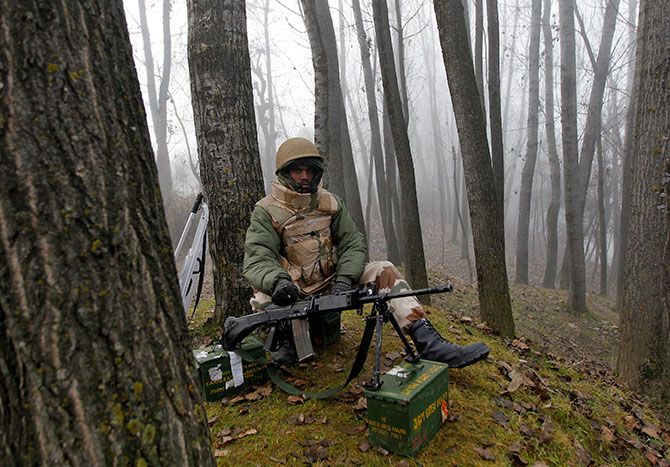 | « Back to article | Print this article |
'All the anti-India groups like LeT, Jaish-e-Mohammad, Hizb-ul Mujahideen have been activated with terrorist camps and launching pads in place,' says Wilson John.

It is not the first time that the Pakistan army has accused the Research and Analysis Wing (R&AW), India's external intelligence agency, of fomenting trouble in Pakistan.
Propaganda against India and its security forces have a staple ingredient of the Pakistan army's proxy war against India for over three decades now. What is, however, different this time is the timing and the possible reasons for such an outburst.
The central premise of the allegations is that R&AW is behind much of the terrorist attacks taking place in Pakistan, especially those happening in Balochistan and the tribal areas.
These allegations have since been magnified many times over by the ISI's media wing through a clever media management strategy exploiting all available media platforms.
It is obvious that the Pakistan army is up to no good. India should be cautious of what lies behind this seemingly sudden provocation. Of the several reasons for this mudslinging at India, the following are noteworthy and are being listed in order of importance:
Propaganda has been an important tool in Pakistan's asymmetric warfare against India.
The Pakistan army prepares the ground for a major attack against India and its assets by raising the pitch of allegations to whip up public support at home, to create a cloak of denial as well a perverse justification for any such acts. This has been the case in the past, including the Mumbai attacks of 2008.
Part of this plan is to revive terrorism in Kashmir. All the anti-India groups like the Lashkar-e-Tayiba, the Jaish-e-Mohammad, the Hizb-ul Mujahideen and others have been activated with terrorist camps and launching pads in place. Recent events in the Kashmir valley show that a season of protests and violence is on. Sporadic attacks against the security forces and the Amarnath pilgrimage are on this agenda.
This is a clever ploy to spoil Prime Minister Narendra Modi's upcoming visit to China by creating a distraction, thereby steering the agenda of discussions to issues where both New Delhi and Beijing have a starkly different position.
For instance, the increasing Chinese presence in Pakistan occupied Kashmir and the possibility of a larger Chinese presence in Pakistan and Afghanistan. The Chinese could very well be on board with the Pakistani plan.
This in preparation for a major military offensive against the Mohajir Quami Movement (MQM) in Karachi and elsewhere in Sindh. There is already a major operation going against the Baloch people in which innocent men, women and children have been targeted.
The MQM, a party of mohajirs (those who came from India after Partition), has been a sore point with the army as well as Prime Minister Nawaz Sharif's Pakistan Muslim League-N.
In fact, Sharif, in collaboration with the ISI, had earlier engineered a split within the MQM and carried out a brutal suppression of the Altaf Hussain faction. The MQM recently has been questioning the army's role in curbing terrorism, a stand which has the made it an enemy in the eyes of the generals.
Along with the MQM, the army wants to put down another rebellion happening elsewhere in Sindh. For a few years, the army has been quietly quelling a slow but steady rise of dissent among Sindhi youth.
Like in Balochistan, the army has adopted the brutal 'kill and dump' policy. Several Sindhi young men, mostly from the University of Sindh, have been kidnapped by the ISI and their whereabouts have remained unknown since then.
The Pakistan Human Rights Commission and other human rights organisations have documented these disappearances.
This is undoubtedly a move to scuttle any possible rapprochement with India.
It is no less important for the Pakistan army that such allegations distract and mislead public attention from the army's colossal failure to contain terrorist groups which it promised to pursue till the end after the December 2014 Peshawar attack.
For all the allegations, the Pakistan army has not come out with any convincing evidence of India's role in Balochistan or elsewhere. The Pakistan leadership have been raising these allegations with their patrons in Washington, DC and Beijing for some time and reported to have passed on several files of evidence against India.
It is strange that the media-savvy Pakistan army has chosen to keep this a tightly-held secret which, in fact, should have been other way round.
In 2009, the Pakistan army had chosen to go public with similar allegations against India and had held a press conference to make the evidence public. Incriminating photographs of Indian-made ammunition used by Baloch rebels were handed over to the media with details of the connivance.
The Pakistani media splashed it with abandoned glee only to be proved wrong by a blogger within hours. The blogger established that the ammunition shown by the Pakistan army to be of Indian-origin was in fact Chinese-made.
The blog (external link) carried the same photographs released by the Pakistan army but with cut-outs showing Chinese inscriptions. That put an end to the Pakistani campaign.
Wilson John is a Senior Fellow at the Observer Research Foundation, New Delhi.
Image: An Indian soldier stationed near Srinagar in Jammu and Kashmir. Photograph: Danish Ismail/Reuters